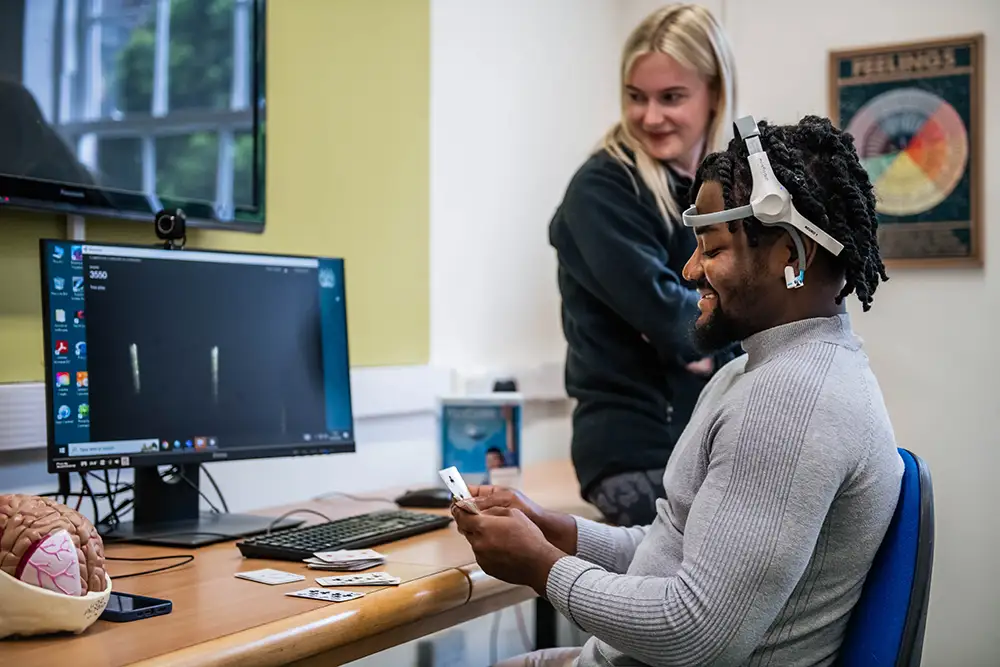BSc (Hons) - Psychology
1st in the UK for student satisfaction (Guardian University Guide 2023)
Do you enjoy investigating and debating ideas? Explore human behaviour and develop valuable graduate skills with our Psychology degree, accredited by the British Psychological Society.
This programme provides an engaging exploration of human behaviour, cognition, advanced research methods, and hands-on experiential problem-based learning.
You will explore human experience across a range of contexts and lifespans, from understanding the biological basis of behaviour to questioning the impact of social media on child development. Part of your degree course will be practical, focusing on research techniques, qualitative, quantitative and mixed methods, data handling and analysis skills, laboratory reports, and communication skills.
Our software and equipment for collecting experimental data includes the Biopac data acquisition system, MindWave Neurosky headsets which are used to study and analyse brainwave patterns, and E-prime software for designing and running psychological experiments.
Lectures and seminars are taught by passionate academics, all of whom are researchers and practitioners, which allows you to benefit from their expertise and cutting-edge research. Our lecturers will get to know you individually to ensure you get the most out of your degree and feel supported throughout. You will also be encouraged to engage in career-enhancing voluntary work.
To help you reach your ideal future career, you will be able to shape your psychology degree to your own interests and ambitions. Your second year, for example, provides an opportunity to undertake an independent piece of work in an area of your choice.
Course Overview
This degree programme is accredited by the British Psychological Society (BPS) and is designed to give you the knowledge and expertise to kickstart a successful career in Psychology. Upon completion of the course, you will also be eligible to apply for Graduate Basis for Chartership (GBC) with the BPS. The skills, knowledge and understanding you gain from the course will therefore help you access a range of rewarding professions within the field of psychology.
You’ll learn through a combination of lectures, seminars, and workshops delivered by our expert academics, and be encouraged to engage in career-enhancing voluntary work, giving you valuable hands-on experience that will allow you to graduate as a confident and knowledgeable practitioner. You will also attend seminars with national and international speakers and engage with real world research projects throughout your degree.
The course offers work experience in a range of areas, including working with young people, in schools, as part of research teams, within different charities, and supporting ex-offenders. We also offer a variety of extracurricular opportunities, such as voluntary research assistant roles, which have led to student publications and conference presentations.
This course is designed to allow you to tailor your degree based on your interests. Our Negotiated Learning allows you to pursue a supervised independent project on any psychological topic of your choice. Current students have explored areas such as clinical and forensic psychology, as well as educational and occupational psychology.
You will therefore be in the ideal position to take the next steps towards a career in clinical, forensic or educational psychology, health education and promotion, counselling, social work, teaching, organisational behaviour, human resources, and prison or probation work.
On this course you will...
- Study psychology at the University of Cumbria, exploring and applying psychological literature to current issues, contexts and experiences.
- Be taught and given high-quality support and guidance by our lecturing team, who are active in research and practices.
- Learn valuable transferrable skills in research, which are highly sought after by employers.
- Have the opportunity to choose topics and areas that you want to learn more about to tailor your learning experience.
- Be able to shape your psychology degree experience to your interests and career goals, allowing us to help you to reach your ideal future career.
What our students say
-
![Lynda Kyle, Psychology]()
After attending the University of Cumbria open day I knew this was where I wanted to go. I liked the location, size and student diversity.
Lynda Kyle, Psychology
After owning her own business for thirteen years, Lynda changed her path and chose to re-enter full-time education. She is now succeeding as an undergraduate Psychology student at the University of Cumbria.
-
![Felicity Griggs, Psychology]()
I feel part of the team, I feel I’m encouraged to be me, to share my thoughts and I feel I am really thriving in this environment.
Felicity Griggs, Psychology
Felicity chose to study Psychology as a mature student, find out how she found the experience and what her next steps are.
-
![Adam Muncaster, Psychology with Integrated Foundation Year]()
Studying Psychology is helping me to achieve my goal of becoming a Health Psychologist. Even though I still have a way to go, my passion for the profession is a great motivator, and I am enjoying being back in education with a clear aim.
Adam Muncaster, Psychology with Integrated Foundation Year
After struggling with his mental health upon leaving the military in 2016, Adam's University of Cumbria journey has seen him find his passion, grow in confidence and become a mental health advocate for others.
Experience Psychology at Cumbria




Location
Carlisle - Fusehill Street Campus
The Fusehill Street campus has been the setting of life-saving treatments since World War I. Now, it's home to world changers, life-savers, crime fighters, and entrepreneurs with access to high-quality facilities and innovative thinking.
Find out more
Find out more about studying with us
Attend an Open Day at Cumbria
An Open Day is your opportunity to explore one of 5 campuses, meet your lecturers, and find out how the University of Cumbria could become your new home.






-200x200.jpg)



